 Your new post is loading...
 Your new post is loading...

|
Scooped by
Gust MEES
|
What does it take to work with an office manipulator? In this piece, the author offers three strategies for dealing with a manipulator at work: First, be skeptical about receiving too much special attention from them. Manipulators don’t usually show their true colors at the beginning of a relationship. In fact, they often present themselves as allies or confidantes. Second, be willing to risk small public confrontations. Sometimes the only way to expose a manipulator’s maneuverings is by confronting them in the moment. Finally, refuse to keep secrets or to act as interpreter in ways that normalize underhanded behavior. Instead, be direct and hold your ground. No matter your power, rank, or status, these tips can help anyone stay productive when forced to work with a manipulative colleague. Learn more / En savoir plus / Mehr erfahren: https://www.scoop.it/topic/21st-century-learning-and-teaching/?&tag=HR

|
Scooped by
Gust MEES
|
Die meisten Kinder freuen sich vor der Einschulung auf ihren neuen Lebensabschnitt. Aber die Umstellung von der spielerischen Kindergartenzeit zum Lernen in der Schule ist groß. „Es ist keine Seltenheit, dass Kinder sich nach den ersten Wochen oder Monaten überfordert fühlen und eine Lernunlust entwickeln“, sagt Fritz Jansen, Psychologe und Autor.
Es sei sehr wichtig, frühzeitig auf eine Lernunlust zu reagieren und die Kinder aktiv zu unterstützen. Im Alltag ist oft wenig Zeit für Gespräche. Doch für die Lernmotivation ist es von großer Bedeutung, dass die Kinder von ihren Erlebnissen erzählen können.
Eltern sollten sich aufrichtig für die Schule interessieren und nachfragen, statt auszufragen, empfiehlt Hanna Hardeland, Lehrerin und Lerncoach aus Hamburg.
Mit den Eltern das neue Wissen und die Erfahrungen zu teilen, macht Kinder stolz und schenkt ihnen Wertschätzung. Wichtig ist, dass Eltern nicht nur Fehler ansprechen - sondern vor allem viel loben. Learn more / En savoir plus / Mehr erfahren: http://www.scoop.it/t/21st-century-learning-and-teaching/?&tag=Psychology http://www.scoop.it/t/21st-century-learning-and-teaching/?&tag=Research

|
Scooped by
Gust MEES
|
False growth mindset is saying you have growth mindset when you don’t really have it or you don’t really understand [what it is]. It’s also false in the sense that nobody has a growth mindset in everything all the time. Everyone is a mixture of fixed and growth mindsets. You could have a predominant growth mindset in an area but there can still be things that trigger you into a fixed mindset trait. Something really challenging and outside your comfort zone can trigger it, or, if you encounter someone who is much better than you at something you pride yourself on, you can think “Oh, that person has ability, not me.” So I think we all, students and adults, have to look for our fixed-mindset triggers and understand when we are falling into that mindset.
I think a lot of what happened [with false growth mindset among educators] is that instead of taking this long and difficult journey, where you work on understanding your triggers, working with them, and over time being able to stay in a growth mindset more and more, many educators just said, “Oh yeah, I have a growth mindset” because either they know it’s the right mindset to have or they understood it in a way that made it seem easy. Learn more / En savoir plus / Mehr erfahren: http://www.scoop.it/t/21st-century-learning-and-teaching/?tag=Growth+Mindset https://gustmees.wordpress.com/2016/11/14/pssst-the-most-important-in-education-understanding/ https://gustmees.wordpress.com/2016/11/01/getting-ready-for-modern-education-first-try-to-understand-what-it-is/

|
Scooped by
Gust MEES
|
The surprising habits of original thinkers | Adam Grant
How do creative people come up with great ideas? Organizational psychologist Adam Grant studies "originals": thinkers who dream up new ideas and take action to put them into the world. In this talk, learn three unexpected habits of originals — including embracing failure. "The greatest originals are the ones who fail the most, because they're the ones who try the most," Grant says. "You need a lot of bad ideas in order to get a few good ones."
TEDTalks is a daily video podcast of the best talks and performances from the TED Conference, where the world's leading thinkers and doers give the talk of their lives in 18 minutes (or less). Look for talks on Technology, Entertainment and Design -- plus science, business, global issues, the arts and much more. Learn more / En savoir plus / Mehr erfahren: https://www.youtube.com/watch?v=fxbCHn6gE3U

|
Scooped by
Gust MEES
|
Many of us can recall a situation when we were humiliated by a teacher. If you close your eyes and recall it, it still has the power to make you cringe. And also for many of us, if we never resolved our feelings with those teachers, we still haven't forgiven them.
Teachers choose to humiliate students for several reasons: to gain control over them, because the teacher is desperate; to frighten other students; or because they're over-compensating for their own lack of confidence. Some teachers actually think they have a right to humiliate a student because the student deserves it. Other teachers think that because students frequently humiliate themselves, especially online, students don't mind being humiliated -- some might even enjoy it. Learn more / En savoir plus / Mehr erfahren: http://www.scoop.it/t/21st-century-learning-and-teaching/?tag=Humility

|
Scooped by
Gust MEES
|
When you experience rejection, it’s natural to take certain measures in order to preserve your self- esteem, like trying to fit in with a social group and gain their approval. However, research has shown that people who view themselves as independent may be somewhat immune to the negative effects of rejection, and may even use social rejection as creative fuel. Sharon Kim and her colleagues, who conducted the study, hypothesized that these boosts in creativity were fueled by a differentiation mind- set, or as they put it, “salient feelings of being different from others.” Independent people not only may be resistant to the negative consequences of rejection but indeed may be strengthened by experiences that reaffirm their sense of independence. As Kim puts it, “Independent selves are motivated to remain distinctly separate from others.” This motivation may, in turn, trigger psychological processes that boost creative thinking. Rejection is not just a catalyst for creativity—it can also be a by-product of it. As the study’s authors write, “The very traits that distinguish highly creative people, such as unconventionality, make them easy targets for rejection.” Learn more / En savoir plus / Mehr erfahren: http://www.scoop.it/t/21st-century-learning-and-teaching/?tag=Creativity https://gustmees.wordpress.com/?s=creativity http://www.scoop.it/t/21st-century-learning-and-teaching/?tag=Sir+Ken+Robinson

|
Scooped by
Gust MEES
|
Cornell professor Kathleen O’Connor, who coaches teams on effective collaboration, says that when psychological safety is absent from the workplace, teams lose the individual knowledge and expertise each member brings to the table and begin to experience what is known as the Common Knowledge Effect.
When this effect is at play, says O’Connor, “teams tend to focus on shared information”, and as a result they have “trouble capitalizing on the diversity of knowledge and expertise in the team”. The very same knowledge and expertise those people were recruited for to begin with. This often leads to poor performance, poor decision-making and missed opportunities for innovation.

|
Scooped by
Gust MEES
|

|
Scooped by
Gust MEES
|
In Chinese philosophy, yin and yang (also, yin-yang or yin yang) describes how apparently opposite or contrary forces are actually complementary, interconnected, and interdependent in the natural world, and how they give rise to each other as they interrelate to one another.

|
Scooped by
Gust MEES
|

|
Scooped by
Gust MEES
|
Tips that work for anyone.

|
Scooped by
Gust MEES
|
Grit in psychology is a positive, non-cognitive trait based on an individual's passion for a particular long-term goal or endstate coupled with a powerful motivation to achieve their respective objective. This perseverance of effort promotes the overcoming of obstacles or challenges that lie within a gritty individual's path to accomplishment and serves as a driving force in achievement realization.
|

|
Scooped by
Gust MEES
|
What would you say are a few of the biggest myths about growth mindset?
OK, myth No.1 is the myth that it’s all about effort, and that you instil it by praising effort. Effort is one factor that leads to learning. So the ultimate value is growth, progress, learning. And effort is one thing that leads there but there are many other things – strategies, using resources, getting advice, guidance and mentorship, and when people leave that out and just praise effort, it’s not transmitting a growth mindset. Adults have nagged children for centuries to try harder. That’s not a growth mindset, it’s an adult nagging a child to try harder!
Also, we find that when teachers think it’s just about effort and praising effort they may praise effort that isn’t even there, or that’s not effective. So if a child tries hard at something and you say ‘great job, you tried hard’, but they didn’t make progress, they didn’t advance, you’re actually conveying a fixed mindset because you’re saying ‘great effort, I didn’t really expect you to do that, and I don’t expect you to do that, so I’m trying to make you feel good about not doing it’. So we need people to understand that it’s appreciating a variety of process variables that lead to learning.
The second myth is that you can teach students a lesson on growth mindset and put a poster up in the front of the room, and that’s that, that they will have a growth mindset from then on. And we know if the teacher doesn’t then embody a growth mindset, if teachers don’t embody growth mindsets in their teaching practices, in the way that they give feedback when the child is stuck, and the way they present a new unit, in the way that they give opportunities for revision and growth of understanding – if they don’t embody that growth mindset, they are not teaching it. And in fact, if their behaviour contradicts the poster at the front of the room, then maybe they’re doing a disservice. Learn more / En savoir plus / Mehr erfahren: http://www.scoop.it/t/21st-century-learning-and-teaching/?&tag=carol+dweck http://www.scoop.it/t/21st-century-learning-and-teaching/?&tag=Growth+Mindset

|
Scooped by
Gust MEES
|
Thinking about Thinking Optimizes Learning
Most teachers know that if students reflect on how they learn, they become better learners. For example, some students may think and process information best in a quiet library; others may focus better surrounded by familiar noise or music. Learning strategies that work for math may be different from those applied in the study of a foreign language. For some, it takes more time to understand biology than chemistry. With greater awareness of how they acquire knowledge, students learn to regulate their behavior to optimize learning. They begin to see how their strengths and weaknesses affect how they perform. The ability to think about one’s thinking is what neuroscientists call metacognition. As students’ metacognitive abilities increase, research suggests they also achieve at higher levels.
Metacognition plays an important role in all learning and life experiences. Beyond academic learning, when students gain awareness of their own mental states, they begin to answer important questions: How do I live a happy life? How do I become a respected human being? How do I feel good about myself? Through these reflections, they also begin to understand other people’s perspectives. Learn more / En savoir plus / Mehr erfahren: http://www.scoop.it/t/21st-century-learning-and-teaching/?&tag=reflection http://www.scoop.it/t/21st-century-learning-and-teaching/?&tag=Psychology http://www.scoop.it/t/21st-century-learning-and-teaching/?&tag=Metacognition

|
Scooped by
Gust MEES
|
No Student Is Unreachable: 4 Strategies To Reach Students That Don't Seem To Want To Be Reached. Students who are challenging–i.e. victims of disruptive childhoods–do not change overnight. They grow. For many of them, that growth is dependent on grasping onto an extremely diminished set of possibilities, interests, and strengths. Ultimately they’ll have the best shot at a stable life by working from the things they are good at and the things they enjoy. We serve them best by spending as much time seeking and discussing their often fragile and submerged interests and capacities as we do their significant needs and disabilities. [Gust MEES] THEY might surprise YOU years later WHAT THEY are able to do in professional life! ;) THEY think mostly if there isn't a box, THEY don't fit in any box anyway!!! Which isn't an obstacle, should GET seen as THAT anyway!!! Learn more / En savoir plus / Mehr erfahren: http://www.scoop.it/t/21st-century-learning-and-teaching/?tag=innovation
Via Amy Burns

|
Scooped by
Gust MEES
|
Hyperconnectés, le cerveau en surcharge, c’est undocumentaire passionnant qui a été diffusé sur ARTE TV, le samedi 3 septembre 2016 à 22h et gratuit sur ARTE+7 en mode replay jusqu’au 10 septembre (voir en fin d’article). Réalisé par Laurence Serfaty en 2016, ce documentaire de 52 minutes s’intéresse aux informations qui nous submergent en permanence : emails, SMS, réseaux sociaux… En se posant cette question : les informations nous submergent en permanence. Ce trop-plein menace-t-il notre cerveau de surchauffe ? Smartphones, ordinateurs et tablettes, nous relient en continu au monde. Mais ce déferlement d’informations menace notre bien-être. Ce documentaire propose un tour d’horizon desrisques de l’hyperconnexion et quelques remèdes possibles. Notre cerveau sans cesse sollicité par les services numériques Chaque jour, des milliards d’e-mails sont échangés dans le monde. Les SMS, les fils d’actualité, les réseaux sociaux, lesapplications mobiles font également partie intégrante de notre quotidien connecté, tant au bureau que dans notre vie privée. Nous disposons ainsi d’un attirail technologique qui sollicite sans cesse notre attention. Comment notre cerveau réagit-il face à cette avalanche permanente de données ? Existe-t-il une limite au-delà de laquelle nous ne parvenons plus à traiter les informations ? Perte de concentration, stress, épuisement mental, voire dépression… Si les outils connectés augmentent la productivité au travail, des études montrent aussi que le trop-plein numérique tend à diminuer les capacités cognitives. Learn more / En savoir plus / Mehr erfahren: http://www.scoop.it/t/21st-century-learning-and-teaching/?tag=Psychology

|
Scooped by
Gust MEES
|

|
Scooped by
Gust MEES
|
Editors' Note: Following the huge popularity of this post, article source Amy Morin has authored a guest post on exercises to increase mental strength here and Cheryl Conner has interviewed Amy in a Forbes video chat about this article here. For all the time executives spend concerned about physical strength and [...]

|
Scooped by
Gust MEES
|

|
Scooped by
Gust MEES
|
Ambiverts have introverted and extroverted traits, but neither trait is dominant. As a result, they have more balanced, or nuanced, personalities. They aren’t the folks yammering your ear off. Nor are they the totally silent ones happily ensconced in the corner.
Ambiverts move between being social or being solitary, speaking up or listening carefully with greater ease than either extroverts or introverts. “It is like they’re bilingual,” says Daniel Pink, a business book author and co-host of Crowd Control, a TV series on human behavior, who has studied ambiversion. “They have a wider range of skills and can connect with a wider range of people in the same way someone who speaks English and Spanish can.”

|
Scooped by
Gust MEES
|

|
Scooped by
Gust MEES
|
"Often mistaken, never in doubt." That wry phrase describes us all more than we'd like to admit. The psychological study of misconceptions shows that all.
The students then were helped ===> to discard naive beliefs <=== and fully embrace scientific ones.
The key is creating an uncomfortable sense of cognitive dissonance; only then are we willing ===> to trade our private versions of reality for something that looks more like the real world. <===
A complex is a core pattern of emotions, memories, perceptions, and wishes in the personal unconscious organized around a common theme, such as power or status (Schultz, D. & Schultz, S., 2009). Primarily a psychoanalytic term, it is found extensively in the works of Carl Jung and Sigmund Freud.
An example of a complex would be as follows: if you had a leg amputated when you were a child, this would influence your life in profound ways, even if you were wonderfully successful in overcoming the handicap. You might have many thoughts, emotions, memories, feelings of inferiority, triumphs, bitterness and determinations centering on that one aspect of your life. If these thoughts troubled you, Jung would say you had a complex about the leg (Dewey, 2007).
Complex existence is widely agreed upon in the area of depth psychology. It assumes the most important factors influencing your personality are deep in the unconscious (Dewey, 2007). They are generally a way of mapping the psyche, and are crucial theoretical items of common reference to be found in therapy. Complexes are believed by Carl Jung and Sigmund Freud to influence the individual's attitude and behavior.
===> In one phrase said: being felt involved and feeling vulnerable to a certain TOPIC which is OUT of NORMAL common sense <===
|



 Your new post is loading...
Your new post is loading...

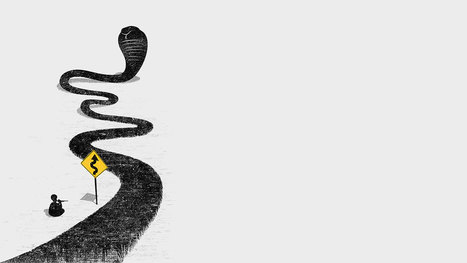



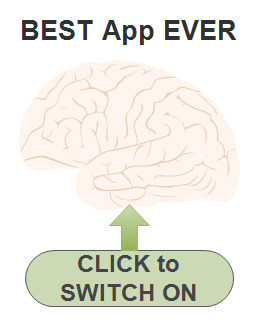
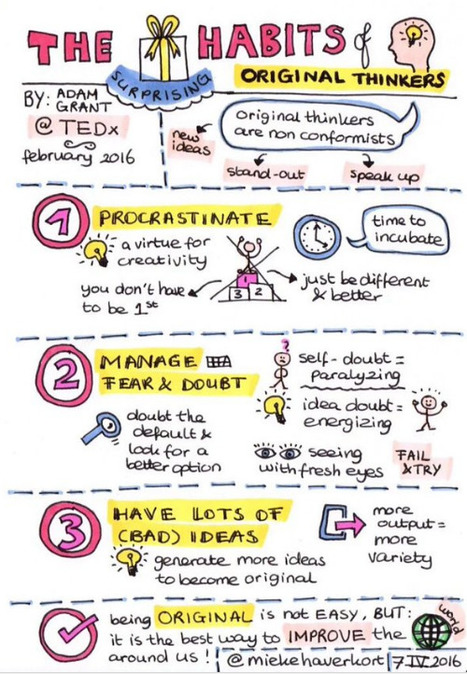

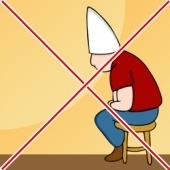
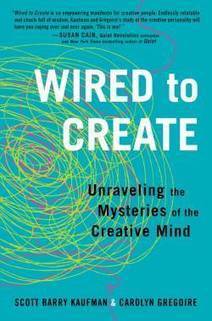
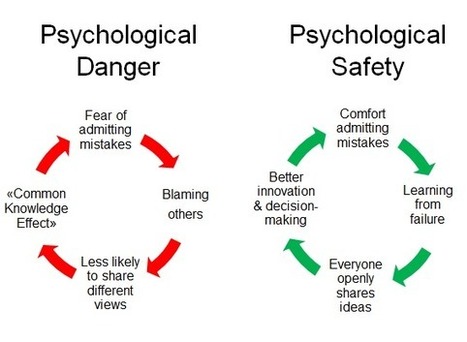

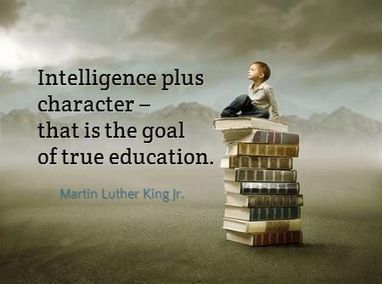




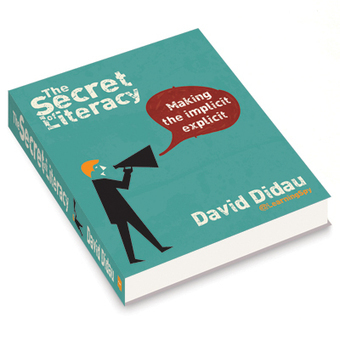
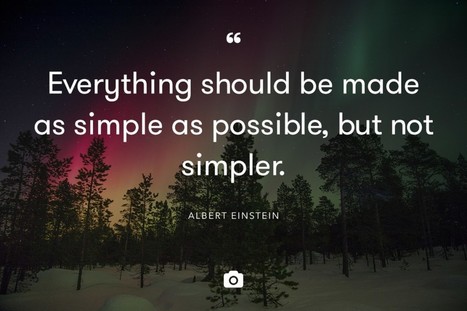
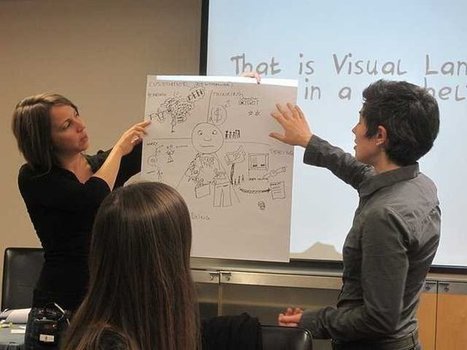





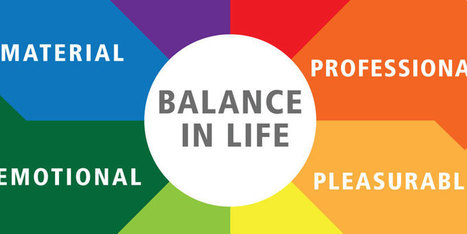
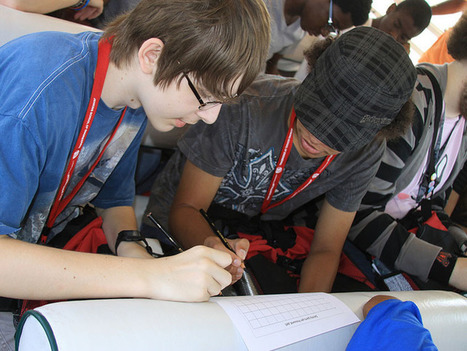


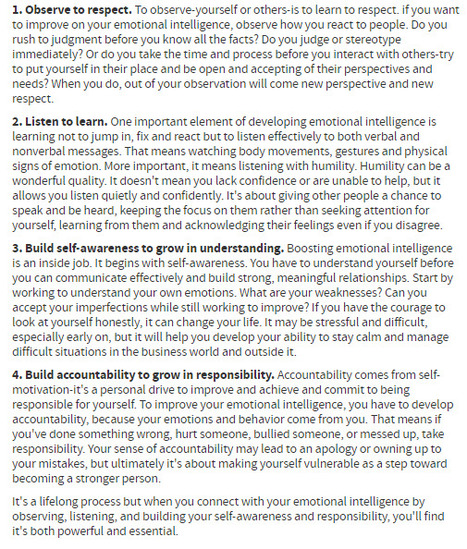

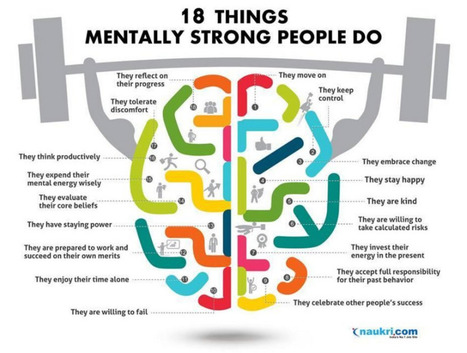

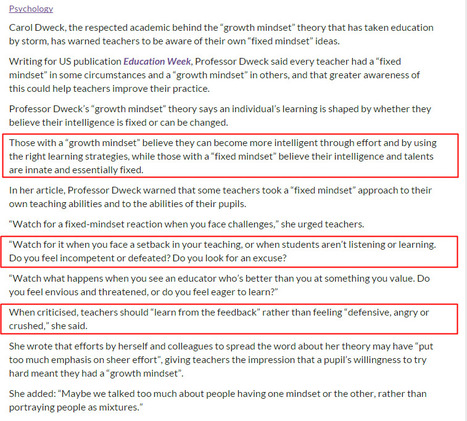















What does it take to work with an office manipulator? In this piece, the author offers three strategies for dealing with a manipulator at work: First, be skeptical about receiving too much special attention from them. Manipulators don’t usually show their true colors at the beginning of a relationship. In fact, they often present themselves as allies or confidantes.
Second, be willing to risk small public confrontations. Sometimes the only way to expose a manipulator’s maneuverings is by confronting them in the moment. Finally, refuse to keep secrets or to act as interpreter in ways that normalize underhanded behavior. Instead, be direct and hold your ground. No matter your power, rank, or status, these tips can help anyone stay productive when forced to work with a manipulative colleague.
Learn more / En savoir plus / Mehr erfahren:
https://www.scoop.it/topic/21st-century-learning-and-teaching/?&tag=HR